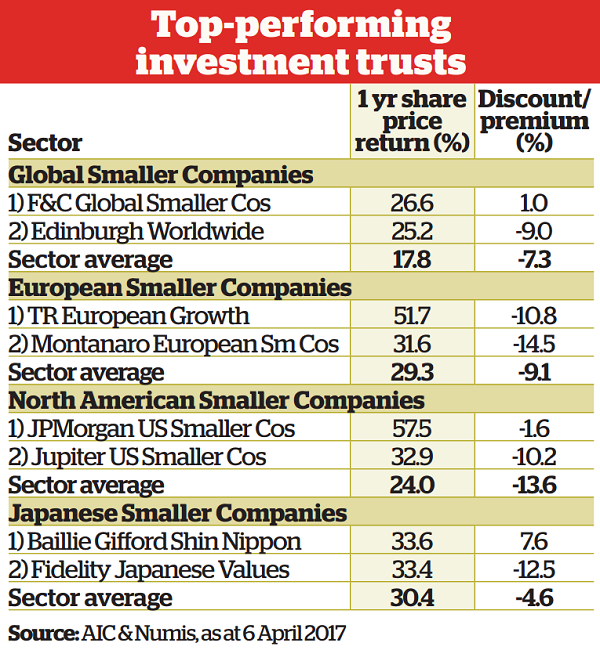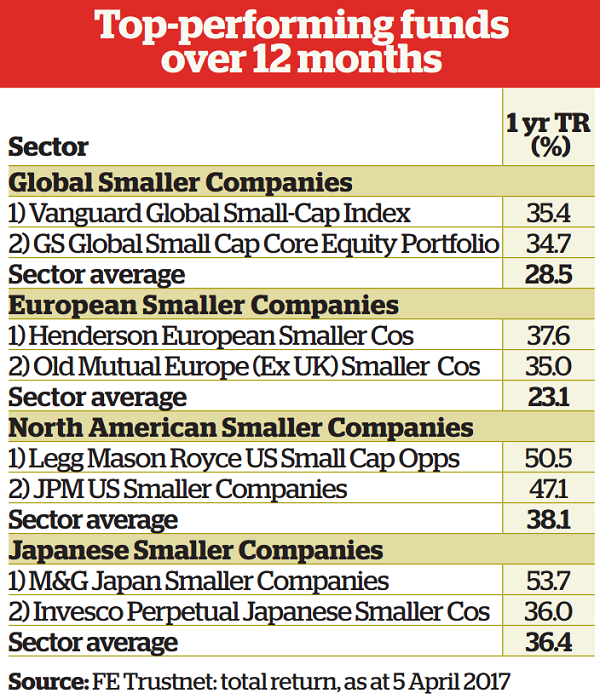Fund tips to profit from powerful lure of small companies
10th May 2017 09:02
by Danielle Levy from interactive investor
Share on
Smaller companies provide investors with growth potential over the long-term. Historically, smaller businesses grow at a faster rate than large capitalisation companies, as they are typically more flexible and innovative.
However, this growth comes at a price: investors take on more risk by backing small-caps, often at an early stage of their development, than they would with large or mega-caps that enjoy an established position in their market.
Ben Willis, head of research at Whitechurch Securities, sums up the situation well. "You are investing in companies that could fail or fall on harder times, but they offer much higher growth potential than mature, large businesses that don't have the flexibility or scope to be market disruptors or future niche players," he says.
Small-cap fund managers enjoy a natural advantage over their peers with a large-cap focus, both in the UK and abroad. This is because small-caps are typically under researched by analysts, and therefore more likely to be mispriced by the market.
"Small-caps around the world have outperformed their larger brethren. Over 10 years, this is very powerful," Peter Lowman, chief investment officer of Investment Quorum, says.
In the UK, the has risen by 34.1% over the past decade, more than double the 15.7% rise from the . But active stock-picking fund managers who are able to seek out undervalued small and AIM-listed businesses have achieved far more impressive returns.
Over the past 10 years, for example, the sits at the top of the Investment Association's UK smaller companies sector with a 255.8% return, according to FE Trustnet. By comparison, the average fund in the sector returned 107.5%, while the average fund in the UK all companies sector returned 69.9%.
It is a similar story for fund managers who invest in small and mid caps across the globe. Citywire data shows that over a five-year period, the leads the way with a 110.3% return, well ahead of the sector average at 85.7%.

UK focus
During the months that followed the UK's vote in favour of leaving the European Union (EU), smaller companies - whose fortunes are typically tied to the domestic economy - fell out of favour as investors grew concerned about the health of the UK economy. Instead, investors piled into large and mega-cap stocks with international earnings offering the potential to benefit from sterling weakness.
Over the nine months since the referendum, the UK economy and stockmarket have proved more robust than many anticipated. As the FTSE 100 continues to hover around the 7,300 mark, some investors are drawn to small-caps because they look cheaper than large-caps.
"On a relative value basis, you could argue that UK small-caps are looking more attractive. What has surprised people is how resilient the UK economy has been. GDP growth is forecast to go up, and we seem to have found a floor so far for the currency as well. All of these things have caused people to start looking at the area again," Willis explains. However, investors must decide whether valuations reflect the potential risks. Is there a stronger investment case for backing small-caps outside the UK?
One of the biggest headwinds facing UK smaller companies is the uncertainty associated with Brexit. Article 50 has only just been triggered, marking the start of a challenging two-year period of negotiations between the UK and the EU. Inflation caused by the fall in the currency represents another significant risk facing UK economic growth and consumer spending - which in turn could weigh on small caps in the future.
"If you look at the type of inflation coming through, it is not necessarily the right kind of inflation," explains Nathan Sweeney, senior investment manager at Architas. "A lot is coming from oil and higher food prices, which is negative because it is taking money out of the retailer's pocket."
At the same time, the UK is seeing very little wage inflation coming through, which means inflation has the potential to dampen consumption, particularly as household debt remains high. This could affect small companies that rely on the health of the UK consumer and domestic economy.

The Trump effect
Due to the question marks facing the UK economy, Sweeney favours international small caps and suggests the US should be the first port of call for investors. Small caps are largely expected to benefit from president Donald Trump's policies, particularly his plan to lower corporate tax rates and return production and jobs back to the US, known as 'onshoring'. Large companies with international earnings, alongside exporters, will benefit less from these measures.
But others are more cautious on US small-caps. They say time will tell if Trump is able to follow through on his ambitious campaign promises. John Husselbee, head of multi-asset at Liontrust Asset Management, suggests investors adopt a 'wait and see' attitude.
The price you pay for an asset is crucial, however strong the investment case may be. Small-caps rebounded strongly in the wake of Trump's election as US president. Since November, the Russell 2000 index has risen by 13.6%, which means valuation opportunities are harder to come by.
On a valuation basis, Husselbee says both Europe and Japan are worth considering. "Both markets and economies are a lot further behind in the cycle than the US, so I think they offer some attractions. However, I think you have to take a view on currency - and the currency decision is quite an important one," he says.
This means making a call on whether sterling will appreciate or depreciate against major currencies from current levels. Ultimately, this can determine gains made from international small-caps. If sterling appreciates and you have not opted for a hedged share class that protects overseas gains in sterling terms, this could wipe out some of your gains. The opposite situation can happen if you invest via a hedged share class and sterling depreciates.
Political risk is another factor to consider when looking at international small-caps. Europe, for example, faces uncertainty as a number of countries take to the polls this year and the Brexit process begins. "Within Europe, the euro and eurozone and the whole of the EU project continue to be fragile, to say the least," Husselbee adds.
More generally, Husselbee prefers to back small-caps in developed markets over emerging markets. This is because emerging markets tend to be inherently more volatile, so by choosing to go further down the market spectrum you are ultimately taking on more risk.
Lowman, on the other hand, is happy to look for opportunities in emerging markets and Asia, pointing to the fantastic growth potential that smaller companies in these markets offer. These businesses offer a purer play on the higher economic growth rates that countries such as India and China are experiencing.
"We are great lovers of diversification: looking at small-caps, you should never put all your eggs in one basket. International small companies offer a fantastic range of stocks and hidden gems - a lot are under-researched. I think you can get some absolute bargains from these markets, particularly emerging markets," he enthuses. For clients with higher-risk portfolios, Investment Quorum invests 10% in small-caps in the UK and internationally.
Top choices for broad smaller company exposure
Liontrust UK Smaller Companies fund, managed by Anthony Cross & Julian Fosh
"The team at Liontrust really know their stuff and have delivered spectacular performance," says Peter Lowman of Investment Quorum.
River and Mercantile UK Micro Cap investment company, managed by Philip Rodrigs.
"Philip Rodrigs is an exceptional stock picker. He does a lot of research on companies and gets to know them well, alongside the management teams and product lines," says Nathan Sweeney of Architas.
Baring Europe Select fund, managed by Nicholas Williams
"We like the fund manager. We look for managers or teams that can demonstrate consistency in style and approach," says Liontrust's John Husselbee. Hermes US SMID Equity fund, managed by Mark Sherlock & Michael Russell "We like that the fund manager looks outside of Wall Street for ideas and looks at slightly boring business models which have a competitive advantage," says Alexander George of Dart Capital.
Baillie Gifford Japanese Smaller Companies, managed by Praveen Kumar and Felicia Hjertman
"The managers have a team approach and the team has had a strong reputation in running Japanese equities for many, many years," says Husselbee.
This article is for information and discussion purposes only and does not form a recommendation to invest or otherwise. The value of an investment may fall. The investments referred to in this article may not be suitable for all investors, and if in doubt, an investor should seek advice from a qualified investment adviser.
This article was originally published in our sister magazine Money Observer, which ceased publication in August 2020.
These articles are provided for information purposes only. Occasionally, an opinion about whether to buy or sell a specific investment may be provided by third parties. The content is not intended to be a personal recommendation to buy or sell any financial instrument or product, or to adopt any investment strategy as it is not provided based on an assessment of your investing knowledge and experience, your financial situation or your investment objectives. The value of your investments, and the income derived from them, may go down as well as up. You may not get back all the money that you invest. The investments referred to in this article may not be suitable for all investors, and if in doubt, an investor should seek advice from a qualified investment adviser.
Full performance can be found on the company or index summary page on the interactive investor website. Simply click on the company's or index name highlighted in the article.